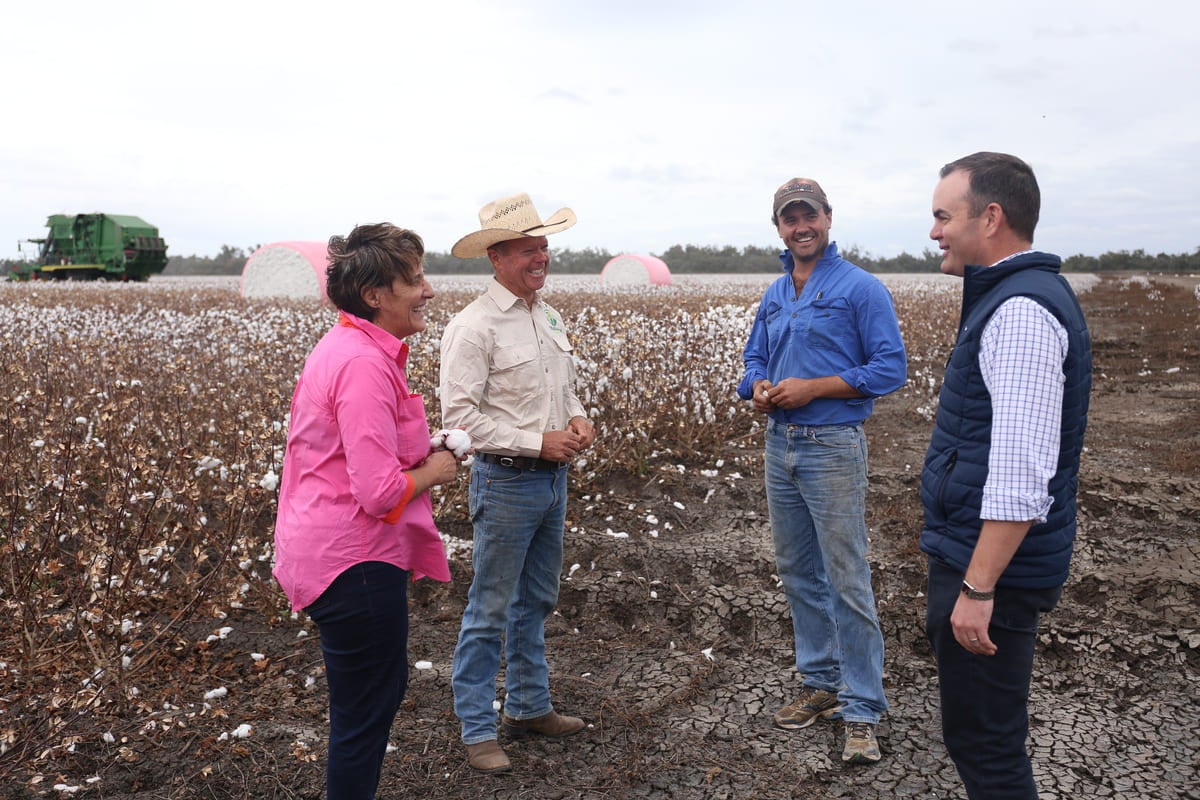Posted by on
26/07/2024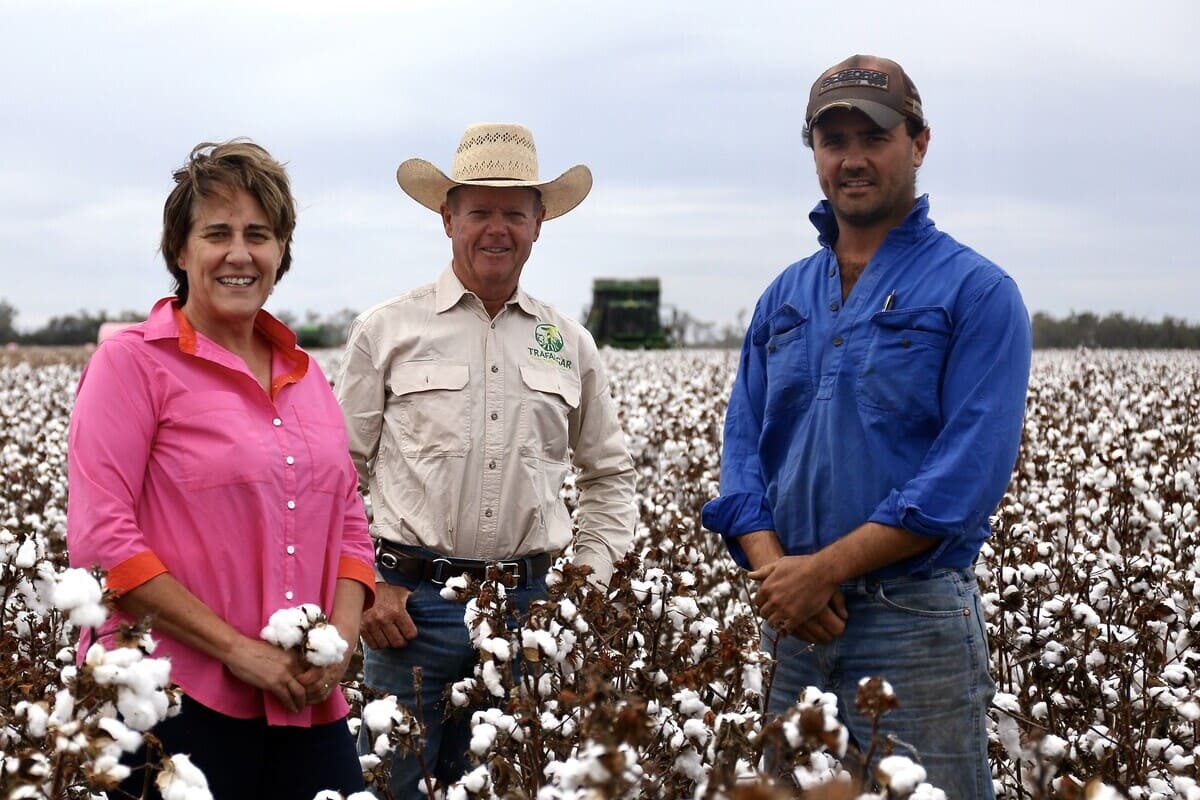
Kathy, Jonathan and Tom Burrell
As young professionals working in cotton during the 1980s, Jonathan and Kathy Burrell were at the forefront of the developing industry.
It was a time of high excitement, a new frontier for Australian agriculture, and little could they imagine the profound impact it would have on their lives.
For Gilgandra’s Jonathan, a Hawkesbury Ag graduate agronomist, and Kathy, a Melbourne girl with a Bachelor of Ag from the University of Melbourne, the fledgling cotton industry represented opportunity – and each ventured north to work for Colly Farms.
“It was an incredible time in Australian agriculture, a productive and profitable new industry was being pioneered by farmers on the ground, and towns like Moree, where Kathy worked as an agronomist, were thriving, most shop fronts were filled with a cotton-based head office, there were young people everywhere – and opportunities galore,” Jonathan reflects with a smile.
Having worked on-farm at Collarenebri’s “Collymongle” and “Iffley”, Jonathan soon got a tap on the shoulder to head further north and west, with Colly Farms breaking new ground in the Dirranbandi region.
“During the 1988/89 season, Colly Farms was tasked with growing the first cotton crop for Cubbie Station, and they needed a cotton agronomist to help,” Jonathan explains.
Working under the late Des Stevenson, Jonathan was in awe of the vision and passion behind the development of Cubbie.
“I had no idea when it came to developing cotton country, and what Des was doing was so large scale, it was like nothing that had been done before – nothing he did was any less than big picture thinking – it was inspirational.”
After 12 months of calling Dirranbandi home, his soon-to-be wife Kathy joined him.
What Kathy didn’t bank on was the cattle block Jonathan drove through every day to access Cubbie Station hitting the market, and his own big picture thinking began brimming with possibilities.
“We couldn’t afford it, and I had a lot of opposition from my wife and mother-in-law, but it was an enterprise we knew, and had full faith in, and with the help of Kathy’s parents who took a 50 percent share in the property we borrowed the full amount and purchased “Trafalgar” in 1995.”
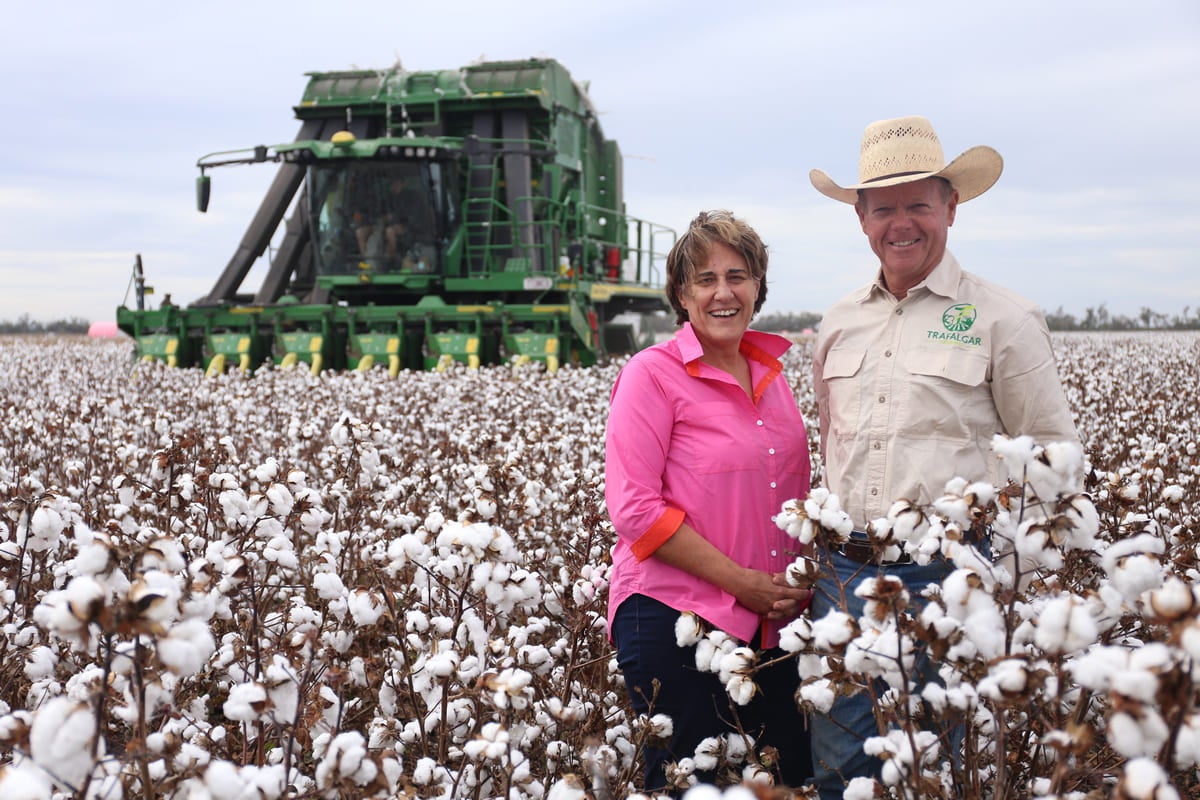
Jonathan laughs that he was so naïve, once they purchased the property he realised he had no money to plant the first crop, so back to the bank they went for some working capital.
“With the debt and working capital it was a risk, but all I saw was opportunity, and during those first five years everything went our way, we had full production years – in fact, thanks to our youthful optimism we expected nothing less, we didn’t really consider the seasons going differently.”
The benefit of hindsight underlines how glorious those early years were for the Burrells, yet they weren’t without an enormous amount of hard work.
“I remember Kathy on the tractor with our third child, Sam, just two weeks old, while our two toddlers, Tom and Sarah, and I walked behind the trailer stick picking,” Jonathan laughs. “We were preparing our first ever field of cotton, and it was all hands on deck developing “Trafalgar”.
“It’s not lost on me how fortunate we were to have a run of good seasons to start, it could have been a very different outcome if the seasons hadn’t gone our way in those early years.”
During their first six years, the couple progressively developed the grazing block into an 860-hectare irrigation property, one field at a time, and have since grown the business, acquiring neighbouring cattle and cotton properties.
Today, their operation covers 19,300 hectares, and includes cotton, cattle and winter cereals.
Creating an Oasis in the bush
The “Trafalgar” homestead has also evolved significantly, sitting by the river within a lush oasis of sprawling gardens – ferns and strappy leafed greenery nestled calmly under dense canopies of shade, creating an impression that’s far more coastal than cotton country.
After 29 years, “Trafalgar” is well and truly home. Kathy and Jonathan have created a place of peace and comfort to return home to each day – and a deliberate distraction from a lifetime of growing cotton that hasn’t always been so prosperous.
Having battled dry seasons, reduced water allocations, and a community often at the heart of the Murray Darling Basin Plan debate, Jonathan and Kathy have been at the coalface of the industry’s timeline of challenges.
However, with son Tom returning home in recent years, the youthful enthusiasm upon which their enterprise was built is back, as is the run of good seasons.
“I don’t think I’ve ever known a time when more young ones are returning to Dirranbandi than over the past five years,” Jonathan explains. “Our community is rebuilding, and there’s an excitement back in the region reminiscent of when Kathy and I first landed here.”
From the local P&C to sporting clubs, like most in the community, the Burrells’ have been tireless in their pursuit to keep the town vibrant.
“In a town the size of Dirranbandi, you might not like each other, but everyone needs each other!” Jonathan laughs.
“You end up with a sense of responsibility and we want to see our community thrive, and the only way to do that is to be part of it. We do it for our kids, and if you’re not on a committee there’s no way to advocate for change.”
Few communities have felt the reduction of services and a community as keenly as Dirranbandi, yet - for now – the hard-fought battle has eased, with youth, business and optimism returning to the region.
The next generation returns
The new frontier for the next generation of cotton farmers is technology and efficiency, and Tom Burrell, who spent nine years working as a pilot on northern Australian cattle stations, is just as excited by the prospects of the industry as his parents were thirty years ago.
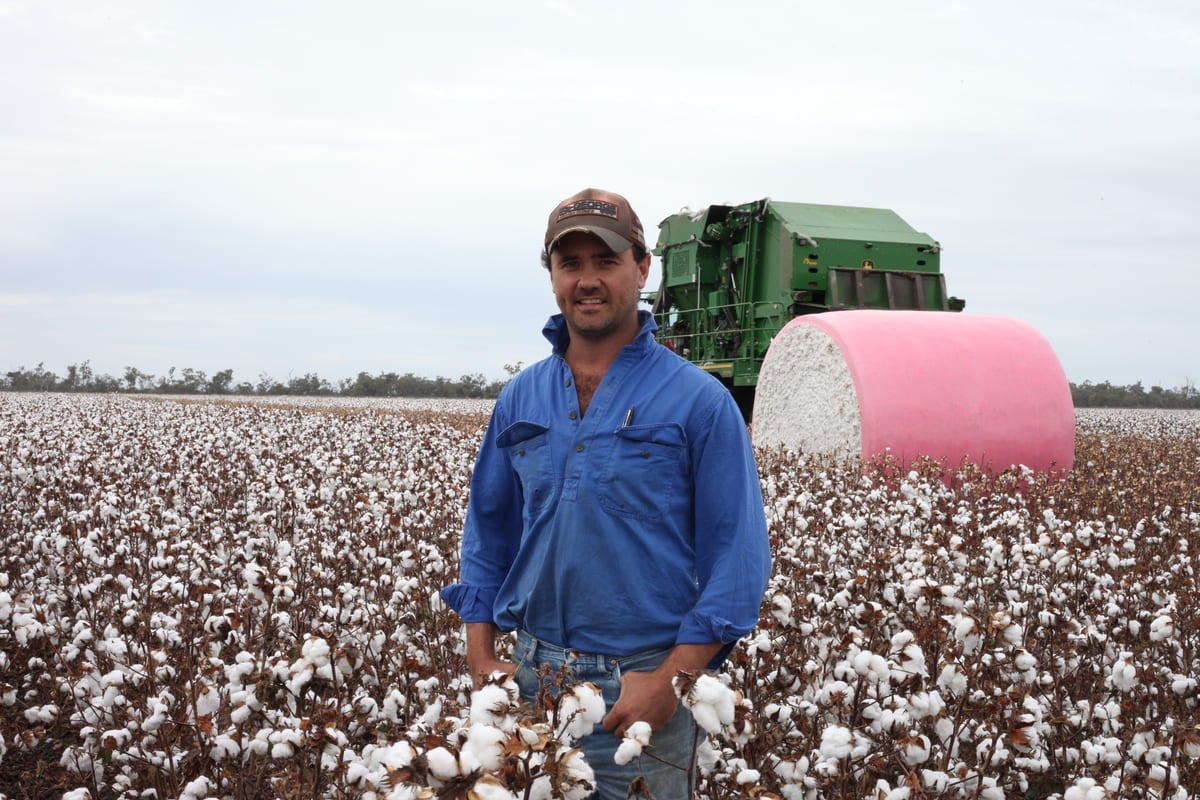
There’s an energy across the Dirranbandi region reminiscent of those early golden years of cotton, and Tom is just one of the new generation helping lead the renaissance.
“It was always in the back of my mind to come home, I originally wanted to be an airline pilot, but it was only after working for a progressive and exciting producer in the north that I was genuinely motivated to come home, and I’m grateful that Mum and Dad have been really accommodating and let me have a crack at putting my ideas forward.”
Their three offspring were teenagers during extremely dry years, and Jonathan and Kathy admit they probably subconsciously encouraged them all into alternative professions.
“We had no expectations of them returning home, Tom went flying, and Sarah and Sam pursued medicine,” Kathy explains.
Tom’s return to the farm in 2019, during the grip of drought, was an unexpected boon, as was the more recent announcement that Sarah was returning to the district as a local GP.
Sarah’s husband Todd also now works on the family property, while son Sam has completed his medical degree, and is now in Melbourne completing his psychiatry specialty.
“I honestly thought we’d end up selling out, particularly amid the last drought, it was a very compelling option to get out while we were ahead,” Jonathan says.
“I got the shock of my life when Tom told me he wanted to come home. His enthusiasm is off the scale, and his return has injected a whole new energy into our operation – we’re all so excited again, and looking to the future and how we can continue to grow our business and tighten our efficiencies.”
Kathy too is clearly enjoying having her birds back in the nest, and smiles that she “loves seeing the boys talk strategy”.
“Tom and Jonathan have a great relationship, and talk frequently about the vision for the business,” she smiles. “Jonathan has always been a unique thinker, and this ‘outside the square’ attitude is always exciting.”
Acknowledging industry progression
In the late 1980s, the first cotton crops Jonathan and Kathy worked on achieved a three bale yield, and in the years that followed, anything above was cause for great excitement, Jonathan explains.
Last year, the Burrells’ grew a six-bale crop, and he doesn’t know any other industry that has doubled its production, while significantly decreasing inputs in the same thirty-plus-year timeframe.
“Cotton’s story is one of progression, it’s an industry where established growers are quick to offer support to the next generation, and there are so many mentors giving advice on everything from row configurations, water use efficiency and all aspects of crop management”.
“It’s an industry where everyone wants to see their fellow growers succeed. There was a time when it felt like the world was against us, so we relied on each other to defend ourselves and our industry, and that camaraderie remains today.”
On his own operation, bank-less channels are one innovation adopted to increase water efficiency, improve yield gains, reduce labour and improve their environmental impact.
“Where it took 10 to 12 hours to irrigate conventionally, it’s now only taking six to eight – there’s no water wastage, and its more labour efficient.”
New fields developed on “Trafalgar” in recent years are all bank-less, with the Burrells committed to converting their entire operation to a bank-less system over the coming years.
In terms of new ideas and vision, Kathy and Jonathan are happy to step aside and let Tom take the wheel.
“If you want to keep the next generation engaged, you’ve got to let them have a run, they’ll no doubt make mistakes, but it’s the best way to learn and grow.”
“I look at Tom’s generation and they network so well, they all know someone who is doing something exciting, and they’re not afraid to ask for advice or help – they’re ready to step up and continue growing this great industry.”
Looking to the future after the Rabobank Carbon Training Workshop
Having recently attended Rabobank’s Carbon Training Workshop in St George, Jonathan admits he was overwhelmed by the inundation of new terminology and acronyms, but the two-day workshop – intended to provide a basic understanding of the foundations of carbon in farming – was extremely valuable.
Armed with their own detailed on-farm data, the course provides an opportunity for producers to calculate their carbon position, and measure their carbon footprint using the Greenhouse Accounting Framework developed by the University of Melbourne.
“We’re not at the point of identifying what we can tighten, but the Rabobank Carbon Workshop has given us an opportunity to analyse our business, and we can see what we’re inputting and outputting, which is valuable data to collate and consider,” Jonathan says.
The engagement of Tanisha Shields was compelling – “She had a presence that made you want to listen, and my only regret is that Tom and Todd didn’t come and do the workshop with Kathy and myself, it was excellent and provided plenty of food for thought.”
The family’s relationship with Rabobank, and their rural manager, has been crucial to their growth.
“We view risk as opportunity, and Rabobank has stood by us through the rough times, shared our vision, and genuinely wanted to see our business develop and grow, and I emphatically stand by that.”
“We’ve only ever had three Rabobank managers, and all have understood our business, and injected their own level of energy – and together with our own energy the synergy produced is excellent.”
“Our rural manager, Owen Webb out of Goondiwindi is excellent, he visits us on farm regularly, and we know his excitement for us is genuine. Having had a background in the cotton industry his expertise and knowledge is extremely valuable, and he’s a great, like-minded person to have on our team.”
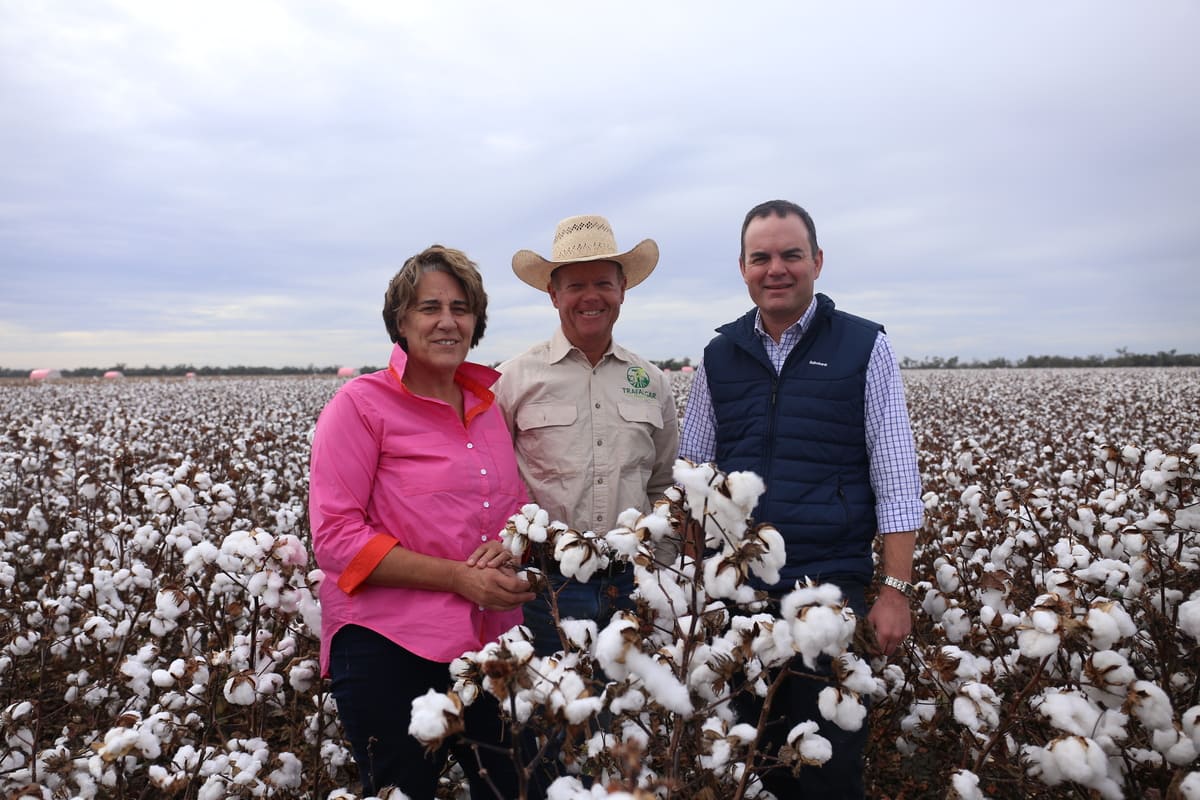
Kathy and Jonathan with their Rabobank manager, Owen Webb.
Having carved a path far removed from what they could have imagined, Jonathan said none of it would have been possible without the trust Kathy’s parents placed in them, which they now hope to extend to their own children.
“We backed ourselves, our skills and our knowledge, and Kathy’s parents’ recognised this and supported us. The little patch we started on out here in Dirranbandi was a long way from where we grew up, but it’s served us well. We are excited for the opportunities it can now provide the next generation, and look forward to seeing our operation develop and adapt in the future.”
